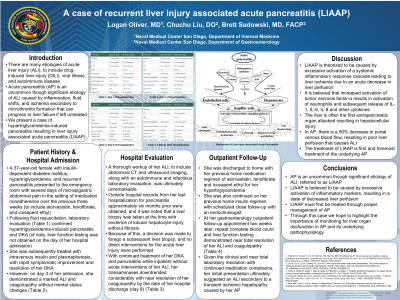Tuesday Poster Session
Category: Liver
P4769 - A Case of Recurrent Liver Injury Associated Acute Pancreatitis (LIAAP)
Tuesday, October 29, 2024
10:30 AM - 4:00 PM ET
Location: Exhibit Hall E

Has Audio
.jpg)
Logan Oliver, MD
Naval Medical Center San Diego
San Diego, CA
Presenting Author(s)
Logan Oliver, MD, Chuchu Liu, DO, Brett Sadowski, MD
Naval Medical Center San Diego, San Diego, CA
Introduction: Acute pancreatitis is an uncommon though significant etiology of acute liver injury (ALI), caused by inflammation, fluid shifts, and ischemia that can progress to liver failure if left untreated. We present a case of hypertriglyceridemia-induced pancreatitis resulting in liver injury associated acute pancreatitis (LIAAP) which was successfully managed through treatment of her pancreatitis and hypertriglyceridemia.
Case Description/Methods: A 37-year-old female with insulin-dependent diabetes mellitus and recurrent pancreatitis presented to the emergency room with several days of mid-epigastric abdominal pain in the setting of medication nonadherence. Labs confirmed hypertriglyceridemia-induced pancreatitis and diabetic ketoacidosis. After treatment with insulin and plasmapheresis, she symptomatically improved. However, she demonstrated a marked ALI and coagulopathy without mental status changes. Labs were notable for an ALT of 5,308 U/L, AST greater than 8,404 U/L, platelet count of 32,000/uL, INR of 2.9, and fibrinogen of 166 mg/dL. With continued inpatient treatment of her DKA and pancreatitis, her transaminases downtrended considerably with improvement of her coagulopathy. After an extensive work-up, DILI and ischemic hepatopathy were considered the most likely etiologies of her ALI. Treatment options included either cessation of her home cholesterol medications given the risk of DILI or continuation of these medications to reduce the risk of pancreatitis. A decision was made to resume her prior home regimen, and she subsequently continued these upon discharge. At a two week outpatient follow-up, she demonstrated complete clinical and laboratory resolution, suggesting her ALI was secondary to a transient ischemic hepatopathy caused by her acute pancreatitis.
Discussion: Acute pancreatitis is a common medical condition, but severe acute pancreatitis can lead to LIAAP and acute liver failure. It is theorized that the excessive activation of a systemic inflammatory response cascade leads to liver ischemia due to decreased portal venous blood flow resulting in poor liver perfusion. The treatment of LIAAP is first and foremost treatment of the underlying acute pancreatitis. It is essential to recognize this disease process as a possible etiology of acute liver injury and acute liver failure. With this case we hope to highlight the importance of monitoring for liver organ dysfunction in acute pancreatitis and its underlying pathogenesis.
Disclosures:
Logan Oliver, MD, Chuchu Liu, DO, Brett Sadowski, MD. P4769 - A Case of Recurrent Liver Injury Associated Acute Pancreatitis (LIAAP), ACG 2024 Annual Scientific Meeting Abstracts. Philadelphia, PA: American College of Gastroenterology.
Naval Medical Center San Diego, San Diego, CA
Introduction: Acute pancreatitis is an uncommon though significant etiology of acute liver injury (ALI), caused by inflammation, fluid shifts, and ischemia that can progress to liver failure if left untreated. We present a case of hypertriglyceridemia-induced pancreatitis resulting in liver injury associated acute pancreatitis (LIAAP) which was successfully managed through treatment of her pancreatitis and hypertriglyceridemia.
Case Description/Methods: A 37-year-old female with insulin-dependent diabetes mellitus and recurrent pancreatitis presented to the emergency room with several days of mid-epigastric abdominal pain in the setting of medication nonadherence. Labs confirmed hypertriglyceridemia-induced pancreatitis and diabetic ketoacidosis. After treatment with insulin and plasmapheresis, she symptomatically improved. However, she demonstrated a marked ALI and coagulopathy without mental status changes. Labs were notable for an ALT of 5,308 U/L, AST greater than 8,404 U/L, platelet count of 32,000/uL, INR of 2.9, and fibrinogen of 166 mg/dL. With continued inpatient treatment of her DKA and pancreatitis, her transaminases downtrended considerably with improvement of her coagulopathy. After an extensive work-up, DILI and ischemic hepatopathy were considered the most likely etiologies of her ALI. Treatment options included either cessation of her home cholesterol medications given the risk of DILI or continuation of these medications to reduce the risk of pancreatitis. A decision was made to resume her prior home regimen, and she subsequently continued these upon discharge. At a two week outpatient follow-up, she demonstrated complete clinical and laboratory resolution, suggesting her ALI was secondary to a transient ischemic hepatopathy caused by her acute pancreatitis.
Discussion: Acute pancreatitis is a common medical condition, but severe acute pancreatitis can lead to LIAAP and acute liver failure. It is theorized that the excessive activation of a systemic inflammatory response cascade leads to liver ischemia due to decreased portal venous blood flow resulting in poor liver perfusion. The treatment of LIAAP is first and foremost treatment of the underlying acute pancreatitis. It is essential to recognize this disease process as a possible etiology of acute liver injury and acute liver failure. With this case we hope to highlight the importance of monitoring for liver organ dysfunction in acute pancreatitis and its underlying pathogenesis.
Disclosures:
Logan Oliver indicated no relevant financial relationships.
Chuchu Liu indicated no relevant financial relationships.
Brett Sadowski indicated no relevant financial relationships.
Logan Oliver, MD, Chuchu Liu, DO, Brett Sadowski, MD. P4769 - A Case of Recurrent Liver Injury Associated Acute Pancreatitis (LIAAP), ACG 2024 Annual Scientific Meeting Abstracts. Philadelphia, PA: American College of Gastroenterology.
